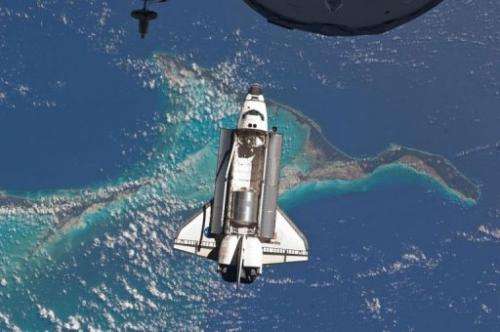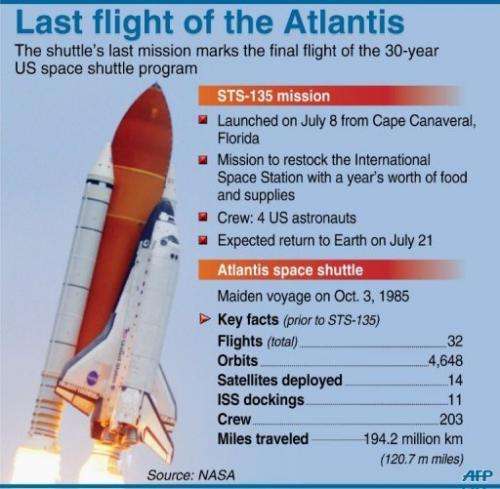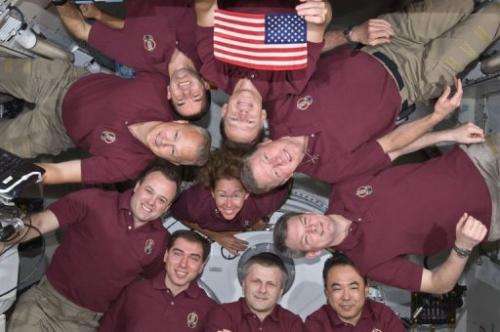US astronauts somber as shuttle era comes to an end

The Atlantis roars back to Earth this week ending America's vaunted space shuttle program and frustrating a generation of astronauts who see their chance to soar into the cosmos sharply limited.
US astronauts bound for space will now have to hitch a ride on the Russian Soyuz rocket, at more than $50 million per seat, until a new US space craft -- a commercial launcher and capsule built by a private corporation in partnership with NASA -- will be ready to fly sometime around 2015.
Once the shuttle lands Thursday in Cape Canaveral, Florida, NASA will rely on Russia to let them rent one of two available seats on the Soyuz, with a third seat on the space vehicle already taken up by pilot.
The end of the shuttle program means that chances for astronauts to do the one thing they are trained for -- fly into space -- will become rare.
"Of course it's hard, because we dedicate our lives to fly in space. We are astronauts and it's what we do for a living," astronaut Steve Robinson, who undertaken four shuttle missions over the years, told AFP.
Over the course of the 30-year program, five NASA space crafts -- Atlantis, Challenger, Columbia, Discovery and Endeavour -- have comprised the fleet of space shuttles, designed as the world's first reusable space vehicles.

Only three of the space vehicles survive after the shuttles Columbia and Challenger were destroyed in accidents that also killed their crews.
But at a time of US budget austerity, President Barack Obama has opted to end the program at a huge savings. Each of the 135 missions over the years has cost about $450 million.
Obama also last year canceled the Constellation Project, which had aimed to put American astronauts back on the moon by 2020. The six year-old project was estimated to cost $97 billion through 2020.
Astronaut Shannon Walker, like most of her NASA colleagues, is disappointed about the end of the shuttle program.
"It's unfortunate, but I know it's the right thing to do to end the shuttle program," she told AFP.
"If we want to do other things we need a different spacecraft," said Walker, who has been aboard the Soyuz but never flown on a shuttle.
She likened the current interregnum between the end of the shuttle program and the next phase of US human space flight -- likely to last about three years -- to the period "after the end of the Apollo program, before the shuttle program started."
Scott Pace, director of the Space Policy Institute in Washington and former NASA official during the George W. Bush administration, said that even with the shuttle program over, there's still plenty for an astronaut to do -- especially in support of the International Space Station.
"There still will be a need for an astronaut corps. It will be at least two American astronauts for the ISS at any particular time," he said.

"Some will be on training for a mission, some will be recovering from a mission," he said.
"There are program support positions on the ground, they will be contributing to both direct mission support for those up there but also working on other programs, other commercial crew programs toward the multiple purpose crew vehicle," he said.
But there is no denying the number of trained US astronauts dropped 59 percent over the past 10 year -- from 149 in 2000 to 61 today, Pace pointed out.
NASA administrator Charles Bolden recently told the House of Representatives Science, Space and Technology committee that there will be opportunities in commercial space flight in the near future.
"My hope is that we will have more that one American commercial-made capability to take humans to space by 2015/16 time frame which will give us several alternatives."
"We are not abandoning the human space flight," he added. "We have a big job to do of operating the ISS for the next nine years at least."
Walker meanwhile said she hoped the end of a space shuttle program will not squelch curiosity and enthusiasm of the future generation of students who dream of space travel.
"You go to a school and ask who wants to be an astronaut and everybody raises their hand," she told AFP.
"I hope the kids will understand we have a space station so there is still a place to go," she said. "The dream for space travel is still alive."
(c) 2011 AFP





















